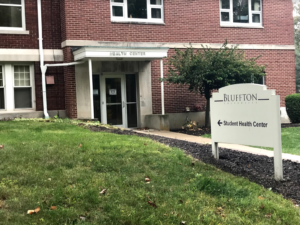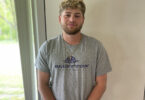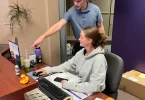As access to healthcare has become more important than ever in the midst of an ongoing public health crisis, Bluffton University has worked hard to provide students with adequate healthcare options by bringing back the on-campus student health center and working closely with in-town health centers.
Even though the on-campus student health care center has been re-established, it “does not look the same as the previous offering,” said a campus-wide email sent out by Bluffton University President Jane Wood on June 3, 2020. The current services offered by the student health center are those more focused on minor, day-to-day health care concerns.

Entrance to the Student Health Care Center located in the lower level of Old Ropp. Photo by Claire Myree.
“The Student Health Center was underutilized, and private medical practices in town were able to provide more consistent access to a higher quality of care for our students,” said Phil Talavinia, vice president of Student Affairs and Athletics at Bluffton University. “However, because of the pandemic we chose to reinstate the clinic in a way that would be beneficial to students for consultations.”
Sherri Winegardner, director of the Bluffton University nursing program and leader of both the Student Health Advisory Committee and the Student Health and COVID-19 Steering Committee, works daily in the student health center from 10 a.m. to 2 p.m., where students can seek care for minor health issues without making an appointment. Students are not billed for seeking medical advice from the Student Health Care center.
“We offer the more minor, consultative services [in the on-campus student health center],” said Winegardner. “For example, if someone has a bug bite or a sore throat I can take a look; we have some over the counter medications. However, we do not write prescriptions for antibiotics. If I think a student needs an antibiotic prescription or anything like that then I refer them to Bluffton Primary Care.”
According to Winegardner, Bluffton Primary Care is the in-town healthcare center the university has worked the closet with throughout the course of the pandemic to ensure students have access to quality care.
“Having this relationship with Bluffton Primary Care has worked really well for us,” said Winegardner. “They make the healthcare needs of our students a priority. In a small community, it’s important that students have a relationship with a healthcare provider that can be found right in town; this establishes a better relationship than just going to an urgent care and seeing a nurse practitioner or doctor that you’ve never met before.”
The university required all students to show proof of health insurance prior to moving onto campus. Bluffton Primary Care works with a variety of insurances, and they are very willing to work with students when it comes to covering medical costs, Winegardner said. The Mercy Health walk-in Clinic and the Bluffton Hospital, both of which are located in Bluffton, accept most insurances.
“Mercy Health and Blanchard Valley Health Systems have a claims process that people can apply to in order to have their bill waived or lessened based on need,” said Talavinia.
When it comes to COVID-19 testing, Wingardner said she has not yet encountered a situation in which a student’s test has not been covered by their insurance.
Most of the in-town and surrounding testing facilities require a doctor’s referral before any COVID-19 test is administered. COVID-19 tests are not provided on-campus, except for the required testing that athletes must undergo.
“Testing supplies are still at a premium, so a physician’s referral ensures that only people who absolutely need to get tested are getting tested,” said Winegardner. “It’s hard to tell COVID-19 from the common cold or the flu because sometimes the symptoms can be fairly minor.”
When a student reports symptoms, that information is sent to Winegarnder who then reaches out to the student to find out more about what their symptoms are, how they are feeling and to determine whether or not it could potentially be a case of the virus.
If it appears that the student has symptoms related to COVID-19, they are put in contact with Bluffton Primary Care where they are seen via Tele-Health appointment, Winegardner said. If the doctor determines that the student needs to be tested for COVID-19, testing is usually done the same day.
“Any student can call me anytime,” said Wingardner when asked what students should do if they have questions or concerns about health or healthcare options. “Students can contact me in the student health center, or they can email me. I am always glad to take questions and help guide students to where they need to go in order to have their healthcare needs addressed.” All resources for student healthcare including important phone numbers, addresses and identification of service can be found online.






